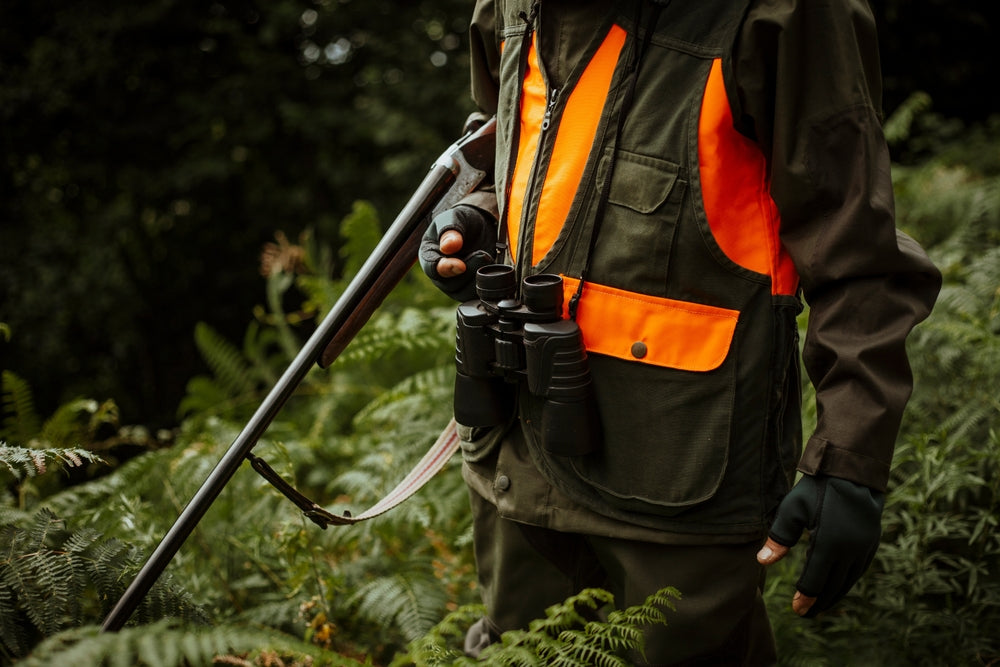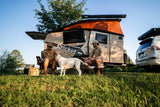Over 15 million people have hunting licenses in the US — and each must follow hunting safety rules to protect themselves and others. However, it’s not just hunters that need to brush up on hunting safety tips. Hikers, campers around the hunting areas, and nearby residents should also stay vigilant during deer and turkey hunting season.
After all, what makes hunting a safe outdoor activity is the collective commitment of all hunters and campers to responsible practices and a deep respect for the wilderness and each other.
Hunting safety for hunters
Whether you’re a seasoned hunting pro or just starting, safety is everything. Every hunter should follow these essential safety tips:
1. Practice firearm safety
Firearms make catching game from a distance easier, but things can go wrong if you don’t follow firearm safety best practices. Before heading out on your next hunting trip, learn or brush up on these fundamental rules of firearm safety from the National Shooting Sports Foundation’s guide:
- Be Careful Where You Point Your Firearm: Never point your firearm at anything you don’t plan on shooting, as accidental discharges happen. Ensure your weapon isn’t pointing at anyone when loading or unloading your gun, know where your muzzle is pointing at all times, and consider ricochets.
- Keep Your Finger Off The Trigger Unless You’re Ready To Shoot: Keep your fingers far away from the trigger during loading and unloading. Even if your safety is on, don’t pull the trigger, as your gun could still accidentally fire.
- Know Your Target: Never take a shot unless you’re certain of your target and what lies beyond it. Because bullets can travel long distances, you have to think about where your bullet will land if you miss.
- Treat Your Gun As If It Were Loaded: Even if you know you don’t have any ammunition in place, treat every gun like it was loaded.
2. Be courteous of others
Being courteous of other hunters isn’t just good manners; it’s also a vital safety measure. You need to respect other hunters, maintain a safe distance, and communicate effectively with them to prevent accidents.
3. Learn basic first aid
Learning basic first aid is an essential aspect of responsible hunting, as it will allow you to quickly and effectively address injuries while in remote locations. Knowing basic skills and carrying a first aid kit can make a major difference when it comes to cuts, sprains, and even more serious accidents.
4. Check your tree stand setup
Tree stands can give you a better vantage point and larger field of view, but you have to use them carefully. Tree stand accidents are the most common accidents in deer hunting, with dozens of hunters receiving medical attention after falling from a tree stand each year. To avoid becoming part of this statistic, follow these tree stand safety tips:
- Practice: Practice makes perfect, so practice setting up your tree stand at ground level before gradually going higher.
- Check your straps and harness: Review how to wear your harness, confirm it is rated for your weight, and inspect your straps for any wear and tear.
- Always attach your harness: Fasten your safety harness to the tree from the instant you begin your ascent until the moment you touch down to the ground again.
- Ensure you purchase the right stand: Only use a tree stand that meets the Treestand Manufacturers Association’s standards and is rated for your weight — as well as all the equipment you plan to bring with you.
- Take care when climbing into or off of a tree: Don’t climb into or out of a tree with an arrow that’s ready to fly or a loaded gun. Instead, carefully raise and lower your gear using a haul line.
5. Let someone know your plans
Even the best hunters can get lost or hurt, so let someone know where you’re going and when you expect to return. This will ensure they have all the information needed to launch search efforts if you don’t return, which could be a lifesaver. Also, take your phone and a portable charger with you in case you need to call for help.
Safety tips for camping near hunting areas
Hunting safety tips aren’t just for hunters. If you’re camping near hunt areas or even just walking in the vicinity, you need to stay safe. You’ll want to:
1. Learn when and where hunting is allowed
Hunters and non-hunters alike need to know hunting season dates and designated hunt areas. Additionally, non-hunters will need to stick to designated trails to reduce their risk of a hunting-related accident, while hunters should keep their licenses up-to-date to ensure they are hunting legally and responsibly.
2. Keep pets safe and secure
Our pets are precious, so keep them at a safe distance from the action. Don’t let your dogs off-leash around areas that allow hunting, especially if your dog loves to chase animals. Consider getting an orange harness or bandana so your dog can also be easily spotted.
3. Wear the right colors
Brightly colored clothing will stand out, making it easier for hunters to see other people and reducing the risk of accidents. Avoid wearing black, blue, brown, green, and other earth-toned or animal-colored clothes that might make you blend in or look like the colors of an animal.
4. Make your presence known
Whether you’re a hunter or a nearby camper, it’s always a good idea to make noise. Whistling, singing, or talking can alert hunters that someone else is around, putting them on guard and helping keep everyone safer. Once a hunter has acknowledged you, you can be a little quieter.
5. Check that your equipment is in good condition
When camping near a hunting area, you need to ensure your equipment is in top shape. If your hunting camp setup and gear aren’t in excellent condition, they might fail when you need them most. Regularly inspecting equipment and keeping it organized in a hunting trailer or camper reduces the risk of critical malfunctions in the field, leading to a better, safer camping trip. Just make sure you have a trailer that’s up to the task.
Thinking about upgrading your gear setup?
By learning these hunting safety best practices, you can ensure you and those around you have an enjoyable, fun, and safe adventure in the outdoors.
When it comes to enhancing your hunting setups, trips, and overall outdoor experience, TAXA habitats can make all the difference. Our TigerMoth is popular among hunters due to its size, light weight, simplicity, and convenience — and we offer camo wrap options for those looking to blend even more into their hunting surroundings.
Ready to upgrade your camping equipment to make your next hunting trip more comfortable and safe? Learn more about TigerMoth’s features!

